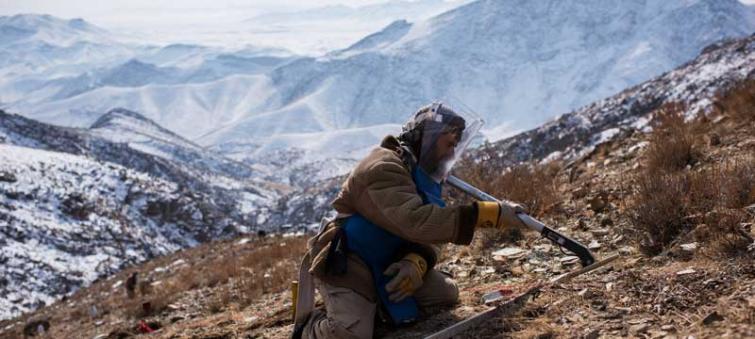
Rising landmine blast toll in Afghanistan highlights long-term care needs of survivors
New York, Feb 7 (IBNS): The number of casualties in Afghanistan from landmines and other explosives has more than tripled since 2012, the UN said on Wednesday, in support of a call to provide more long-term support for survivors.
Latest data from UNMAS, the UN Mine Action Service, shows that 1,415 Afghan civilians were killed or injured by mines and so-called explosive remnants of war (ERW) in 2018.
Children make up eight in 10 of ERW casualties, according to UNMAS, which is attending the 22nd Meeting of Mine Action National Directors and United Nations Advisers (NDM-UN) in Geneva this week.
The UN agency notes that since 1989, more than 18 million ERW items have been cleared, along with more than 730,000 anti-personnel mines including over 750 improvised explosive devices (IEDs) and 30,145 anti-tank mines.
“We are still in the prevention business and we aren’t doing all that well,” said Patrick Fruchet, UNMAS Programme Manager, Afghanistan. “In 2012, we were down to about 36 casualties per month in Afghanistan - which is still enormous; those numbers jumped, those numbers jumped year on year. And in 2017, there were more than 150 casualties a month.”
This spike in casualty numbers is linked to “new contamination” by anti-personnel weapons in the country, linked to intensifying conflict between Government forces and Taliban extremists, after 2014.
“We are struggling to handle significant increases in the number of minefields in Afghanistan,” Fruchet said, noting that the work of the UN agency and its partners was complicated by the fact that the authorities control only around half the country.
“You have provinces where the provincial capitals are very friendly, under Government control, and the rural areas outside those capitals are not, and that is very often where we work,” he said.
Increased funding is critical to Afghanistan’s bid to be landmine-free by 2023, UNMAS says, noting that the Government’s $85.1 million appeal for clearance activities is only around 50 per cent fulfilled.
In an appeal for increased international support and awareness, head of the Legacy of War Foundation and photographer, Giles Duley, described how important long-term care was to his recovery after he lost both legs and a forearm to a landmine in Afghanistan.
A fellow survivor he’d met in Cambodia had not been so lucky and was “living like a dog” because no-one had helped him to learn how to walk on his prosthetic legs, Duley explained.
Duley insisted that despite the vast amounts of money spent helping victims in the immediate aftermath of an attack, “a huge gap” is left in relation to their longer-term needs.“At his house - or his sister’s house where he stayed - we sat there, we drank some tea and we chatted,” he said “Eventually, he showed me the side of this house some beds where the dogs slept. And he pointed to one of the large dog baskets and he said, ‘That is my bed.’ Now his sister was a wonderful woman, she was doing what she could, but she lived in poverty, she had her own family, and so her brother was literally living like a dog.”
“And really that is what we are calling for,” he said. “It’s the opportunities for people injured in conflict through no choice of their own, often children who have a full life ahead, are given support to regain their dignity and to be able to support themselves and their families again. It’s not that complicated, it’s not that difficult. We spend millions saving lives, we have to help them get their lives back.”
Without rehabilitation of war victims ‘the country will fail’
Trauma surgeon Shehan Hettiaratchy, from Imperial College Healthcare in London, underlined the wider benefits of accurately assessing survivors’ needs, both for individuals and their communities.
“What we’re trying to do is characterise, what is that healthcare burden once the fighting stops,” Mr Hettiaratchy told journalists. “How long does it go on for? What is it at year one? What’s the healthcare intervention needed to maintain these people whose lives have been saved at high levels of function, so they can contribute back to the society? Because if we don’t have that socio-economic rehabilitation of the victims of war, the country will fail.”
In Afghanistan, landmine survivors make up a small fraction of the nearly three per cent of the population that is registered as having a disability, according to UNMAS.
Blast victim Dr. Mahpekay Sediqi, who works at Kabul Orthopedic Organisation in Afghanistan, echoed the importance of having the latest data to hand: “As of now, the donors don’t have a real picture of the needs in Afghanistan,” she said. “As we said before, the speakers mentioned 2.7 per cent of the population of Afghanistan have disability, but this number is from 2015.”
In the nearly 30 years since UNMAS has been working in Afghanistan, 30,000 people have been either hurt or killed by explosive devices.
Image Credit: UNMAS/Cengiz Yar
Support Our Journalism
We cannot do without you.. your contribution supports unbiased journalism
IBNS is not driven by any ism- not wokeism, not racism, not skewed secularism, not hyper right-wing or left liberal ideals, nor by any hardline religious beliefs or hyper nationalism. We want to serve you good old objective news, as they are. We do not judge or preach. We let people decide for themselves. We only try to present factual and well-sourced news.







